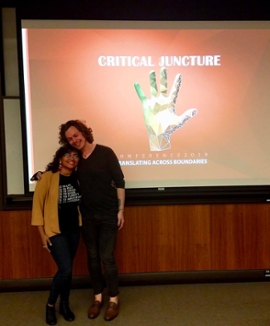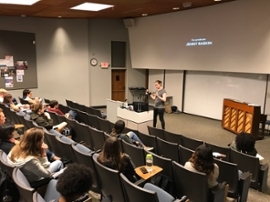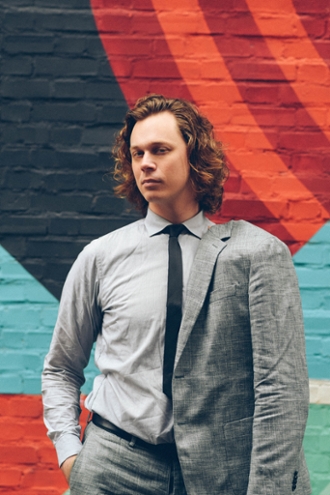The Laney Graduate School is proud to announce Michael Vaughn as a 2020 Eleanor Main Student Mentor Award recipient. Vaughn is graduating with a PhD in Sociology and a Certificate in Women's, Gender, and Sexuality Studies. During his six years in the Laney Graduate School, Vaughn has mentored both undergraduate and graduate students through his research, teaching, and academic advisement.
Named in honor of the late Dr. Eleanor Main, a transformative leader at Emory, and a devoted advocate for graduate education, the award recognizes individuals who exemplify mentoring of the highest quality in graduate education. Vaughn is one of two recipients of the award that is presented each year during the Laney Graduate School commencement ceremony.
"Receiving the Eleanor Main Award is a dream come true," Vaughn said. "I've dedicated so much of my time at Emory to student support, be it through Academic Advising, RISE, teaching, or my one-off student mentorship."

Through Research in Sociology at Emory (RISE), he has trained many undergraduates on research projects, where students learn research design skills and have the opportunity to do hands-on research.
Vaughn also facilitated many valuable opportunities for research training and career development for his fellow graduate students. "Michael is always the first to offer notes, sample materials, grant writing tips, or to grab a coffee to chat about research design," said Emily Pingel, a fellow graduate of the Sociology program. "He strives to increase access to training and information in any way he can, including facilitating graduate workshops on research methods."
In addition, "Michael dedicated hundreds of hours to creating workshops and panels to provide Emory graduate students with cutting-edge interdisciplinary research tools and access to new ways of thinking," noted Pingel.
For example, Vaughn co-organized the Critical Juncture 2019 conference -- an intersectional forum for emerging scholars, artists, and activists to present their work and to advocate for social justice.
But he would not have developed such skills without the influence of his mentors. While studying sociology and psychology at State University of New York College at Geneseo, Vaughn was a mentee of sociologist Dr. Anne Eisenberg. Her mentorship left a lasting impact because she left room for him to make mistakes.
"Anne Eisenberg is still one of my key mentors, providing me with clear guidance, the space to make mistakes, and the empathetic support I need to be successful," Vaughn says. "Because of her, I can take my clinical training and apply it to my research and teaching."
When delving into social work during his undergraduate program, Vaughn received support from Eisenburg, who helped him minimize the damage of potentially pursuing a path that would not be right for him. As a result, he joined a Master of Social Work program at Hunter College, at the City University of New York.
"While I dropped out in my third semester, I had the opportunity to be a research assistant on studies about group decision making and learn from a cadre of amazing clinicians about how to approach individuals and groups with empathy, compassion, and patience," Vaughn said. "And, most importantly, I learned always to strive to meet the client where they are."
Vaughn was also greatly influenced by the mentorship that he received at Emory. He credits his advisor Irene Browne, PhD, associate professor in the Department of Sociology, with helping him discover his approach to teaching.
"Irene has this amazing capacity to hear students out and understand the subtext of their situation, particularly in terms of race, class, gender, sexuality," Vaughn said. "She gets it and continues to educate herself on how intersecting systems impact everyday life."
Vaughn's approach to mentoring draws from the intent to meet students where they are in their own lives. He chooses to honor their lived realities rather than imposing his own will and goals onto them.
"I strive to be real with my students," Vaughn explained. "By that, I mean that I only make claims that I know are evidence-based. The first expectation I make clear is that sociology as a discipline has shown that oppression exists; we, as social scientists, study how it operates and have a mission to minimize harm. That's the foundation of the class and, I would argue along with many other scholars, one of the foundations of modern-day sociology."

In his doctoral work, Vaughn studied how trauma impacts the way gay men understand themselves. In his dissertation, Vaughn explores how the HIV/AIDs epidemic affected and continues to impact the lives of gay men by using hauntology, a theory developed by the University of California, Santa Barbara sociologist Dr. Avery Gordon.
"People often talk about the past influencing the present – maxims like 'history repeats’’’ Vaughn says. "Hauntology is a way for people to think carefully about what that means and what history "repeating" might mean."
Specifically, Vaughn's work explores the ways sexuality is understood in society and how trauma can disrupt that agreement, resulting in different generations using the same definitions but with different meanings.
"This can fuel inter-generational divides. Imagine trying to interact with someone who you think is like you, someone who holds the same identity as you, but you realize that they hold different beliefs about sexuality," Vaughn says.
Vaughn will continue to explore the hauntology of trauma during his postdoctoral fellowship at Columbia University's HIV Center for Clinical and Behavioral Studies.
"I am currently working on turning my dissertation into a book, so I will be continuing my current research while jumping into new and exciting studies led by my new mentors," he said. "I am excited to continue to learn and grow as a mentor while at the Center. I think that the transition will be vital for me to continue to grow as a mentor and learn how to support junior scholars within this new kind of power differential."

